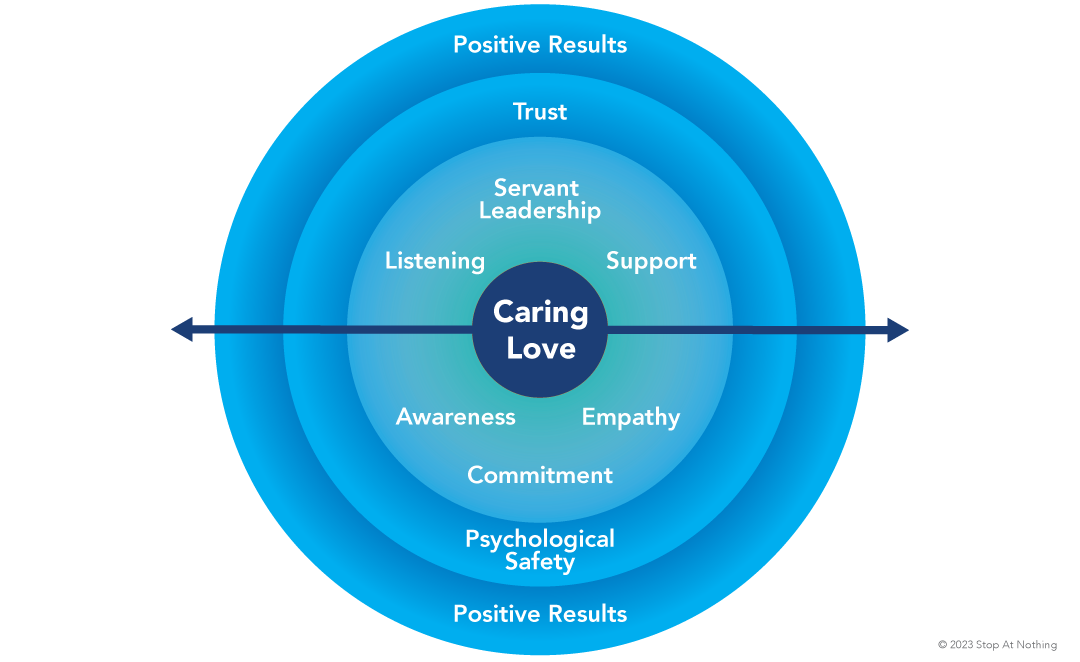By Tim Matson – July 2023
“Life’s most persistent and urgent question is ‘What are you doing for others?’”
—Martin Luther King, Jr.

I sat at the end of the dock in an Adirondack chair as the sun set on a perfectly still lake—one of my favorite spots in the world. The lighting, the temperature, and the moment should have been perfect, but even in the beauty of the scene, I felt hollow.
I looked over at a nearby glider chair and saw my mom, patiently watching the sun dip behind the distant trees. As the last glimmers of the day’s light slipped through the branches and bounced across the lake to join us, her image began to fade. The final rays moved beyond the horizon, and I was left alone with the empty glider next to me.
We had lost her a few months prior. She had courageously fought a battle with liver disease, and though her body had finally given in, her spirit couldn’t be broken. That evening, with the reflections of the cottages, trees, and clouds dancing silently on the water, I became lost in the reflections of my mom.
Selfless Caring and Agape Love
Marlene Elizabeth Matson taught us so much. Her life was the classroom, and she taught us great lessons through her actions. She taught us to laugh, persevere, be creative, and make spaghetti sauce. She taught us so much, but the greatest lesson she taught was love.
I want to make an important distinction here. I don’t mean the word “love” we hear hundreds of times each day. Not the “I love the Steelers” kind of love, or “I love donuts,” or even the casual “I love you” that we often throw around so easily. My mom lived a love that was selfless caring, agape love. She loved unconditionally, wanting the best for everyone. She cared for family, neighbors, those in her church, and, most importantly, she cared for those she didn’t know and even those with whom she disagreed. Marlene lifted everyone through her love, demonstrating it through her actions.
This intentional, sacrificial love seems to be missing in so much of the world today, including our schools, homes, on our roadways, and importantly, in the workplace.
Great leaders and managers demonstrate this kind of selfless, caring love.
Think, if you would, for a moment, about the best boss you ever worked for. What characteristics made them great in your eyes? How did they act? What did they do?
I’ve asked these questions many times, and often the individual would recount a story of a specific event, show a tattered card or thank you note, and often get very emotional. In almost every story, there was some form of selfless, caring love.
Servant Leadership
Robert K. Greenleaf first coined the term Servant Leadership in his 1970 essay The Servant as Leader. His theory proposed that the best leaders were servants first. Reflecting on the genesis of his idea, he wrote “We in this country were in a leadership crisis and that I should do what I could about it.” He believed that caring for people was the “rock upon which a good society is built.” Further, individual caring leadership could be institutionalized, leading to incredible results.
The core of any such service must be selfless love.
With a strong core of caring love, the leader can then practice Servant Leadership. They can develop their self-awareness, listening skills, and create a supportive environment. This setting will foster trust between the leader and their employees and lead to Psychological Safety.
Psychological Safety is a key ingredient in the success of teams, and successful teams deliver positive business results. However, it all starts with caring love.

John Wooden, the revolutionary UCLA Basketball coach, felt that “love” was the most important word in the English language. In addition to his famed Pyramid of Success, he had a Stairway to Heaven, with “love” being the closest rung to the top, followed by other rungs of “caring, sharing, giving, forgiving, and kindness.”
While Wooden practiced caring love, he was a strict disciplinarian. It is critical to understand that practicing caring love does not mean a lack of accountability. If you truly want the best for someone, then you give them tools to be successful and hold them accountable to use them. When communicating a challenging message, it’s in the intent, approach, and delivery that show you care.
So, why then, don’t we demonstrate caring love as a leader or manager? What hinders us from doing so?
Fear
The fear that lies in our self-talk, in the subconscious of our being, and in our belief structures about ourselves. Fear that we aren’t good enough, aren’t worthy, that others won’t like us, and that we are powerless. These fears may not be rational, but they can paralyze us and affect the person and leader we want to be.
I once spoke with a manager who said that they never asked any personal questions of their team. When I asked why, he said that could “open Pandora’s box.” Upon further probing, he explained, “How would I look if their answer to my question about their child was that they have been ill for several years? As a manager, it would show that I don’t care by not knowing that fact.” His fear of not being liked caused him to refrain from asking the questions, which led to damaged trust with his team.
The best leader that I ever worked for always prioritized me, the person, first. Business was important. Our reason for existence as a company was to make a profit, but it always came second to his employees. Because of his approach, they would run through brick walls for him, leading to some spectacular results.
Great leaders put their fears aside and demonstrate caring love. If we can practice awareness, empathy, listening, commitment, and support with our employees, the response will be overwhelming. Trust will grow. What you do with that trust is also important. You will need to leverage that environment to paint a vision, execute a plan, and deliver whatever results are needed. But without trust, born from caring love, growth will be stagnant or unsustainable.
I miss my mom immensely. However, the pure, selfless, caring love she demonstrated her whole life will live on forever. I hope to honor her by putting my fears aside and sharing it with all that I interact with.
Will you join me?

